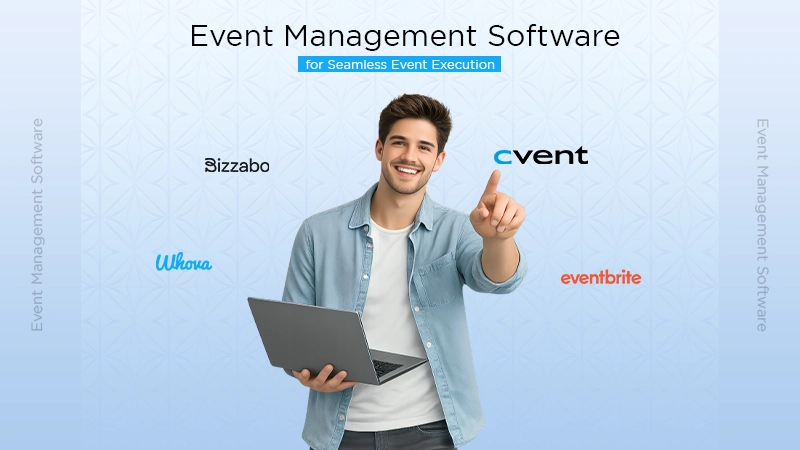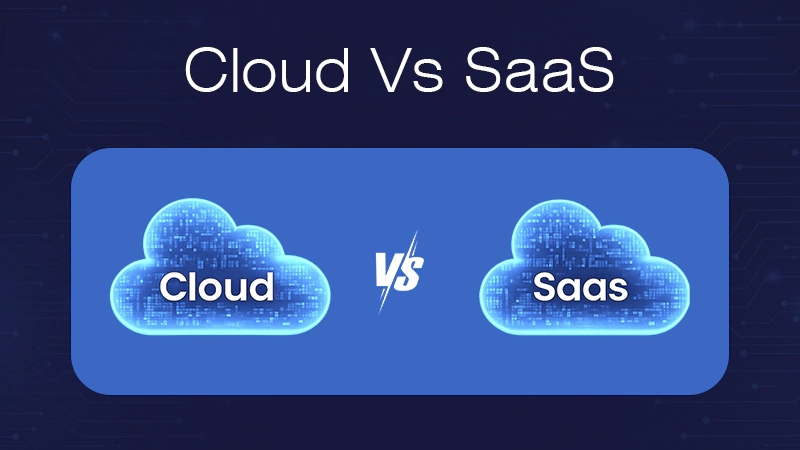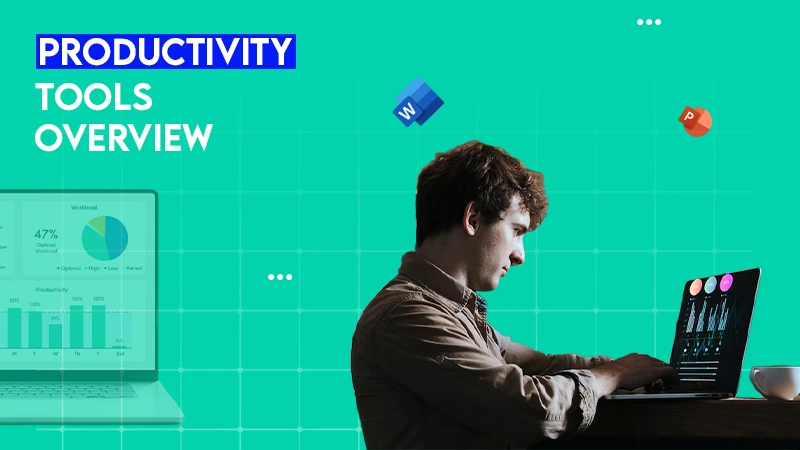Ans: Yes, both systems can and should work together. A well-planned integration can help your business in multiple ways.
ERP vs CRM: Understand the Key Differences, Functions, Benefits, and More
ERP and CRM are two of the most common terms used in business management. However, many people mix them up, and figuring out what sets them apart can be tricky.
In simple terms, CRM helps you manage customer relationships (like sales, marketing, and support). ERP, on the other hand, takes care of behind-the-scenes work like finance, inventory, and HR. Both systems help streamline your business and cut down on manual work.
Let’s explore this ERP vs CRM guide to know how they differ and how they can work together. This can make a big difference in how efficiently your business runs.
- What is ERP (Enterprise Resource Planning)?
- What is CRM (Customer Relationship Management)?
- ERP vs CRM: Key Features
- ERP vs CRM: What’s the Real Difference?
- Similarities Between ERP & CRM Systems
- Benefits of Using CRM vs ERP
- How to Choose the Right System for Your Business?
- Integration of ERP and CRM Systems
- Final Verdict: CRM or ERP?
- Frequently Asked Questions (FAQs)
What is ERP (Enterprise Resource Planning)?
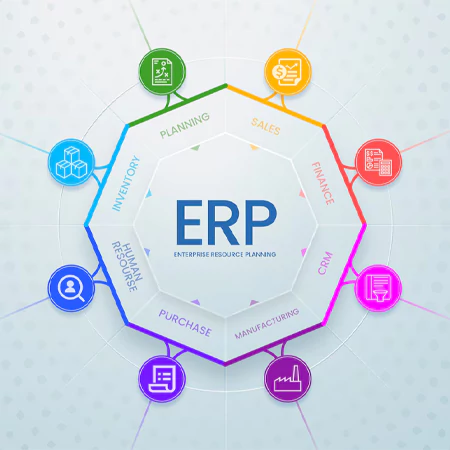
Enterprise Resource Planning is a software system that helps businesses run more smoothly by connecting different departments, like finance, HR, and supply chain, into one place. Instead of each team working with separate tools and data, ERP brings everything together.
It makes it easier to manage day-to-day operations. All parts of the business can share real-time information. This means teams can make faster and smarter decisions because they have a clear picture of what’s happening across the company.
ERP software also cuts down on manual work by automating routine tasks, saving time, and reducing errors. One of the biggest advantages of using it is better coordination between departments. In short, this system helps companies stay organized, efficient, and ready to grow in today’s dynamic environment.
What is CRM (Customer Relationship Management)?
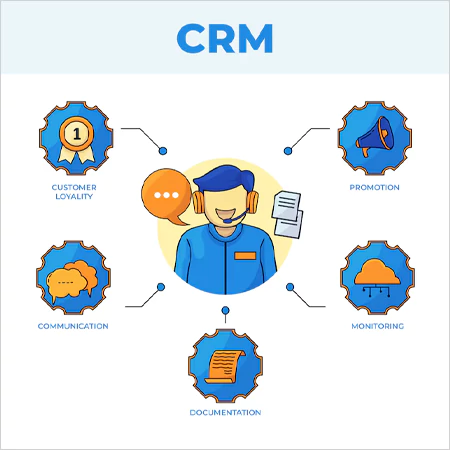
Before we start with the comparison between CRM & ERP Software, let’s try to quickly understand the CRM software. Customer Relationship Management is a tool that helps you keep track of all your customer information in one place, like names, phone numbers, and past conversations.
If someone contacts your support team, their message is saved automatically. You can also add offline details manually. The main goal is to help you understand your customer better, what they like, what they need, and where they are in their buying journey.
This allows you to reach out at the right time, build strong relationships, and send more targeted messages. It also makes teamwork easier, since everyone on your team can see the full history of customer interaction and stay on the same page.
ERP vs CRM: Key Features
Now that you know, “What is ERP and CRM?”, let’s try to understand the key functions of both systems.
Key Features of ERP
ERP software helps you run your business smoothly by bringing everything, like data, processes, and departments, under one roof. Here are some important things an ERP system can do:
- Manage Finances: It keeps track of what you owe, what you are owed, and income from different sources. Every piece of information is in one place.
- Supports Sales and Marketing: It can track sales numbers, coordinate with marketing, send invoices, and manage stock changes.
- Manage Inventory: It allows you to see your stock levels across locations, so you know what is available and what needs restocking.
- Supporting HR: It helps with employee tasks like attendance, payroll, and onboarding new team members.
- Improve Supply Chain: It makes buying materials easier and connects with inventory tools to keep everything updated.
- Provide Valuable Insights: It gives you clear, real-time reports from across the company so you can make better decisions.
Key Features of CRM
A CRM system helps you stay connected with leads and customers, making your sales and marketing more effective. Here are some of the core features of CRM you should know:
- Contact Management: It keeps all your customer information in one place. Contact details, past conversations, order history, and other details are updated automatically whenever there is a change.
- Automation: It helps you in automating repetitive tasks like sending follow-up emails or running drip campaigns. It helps you stay consistent without extra effort.
- Marketing Tools: It allows you to group your audience based on interests or behavior, so you can send more relevant and targeted marketing campaigns.
- Analytics: It tracks what is working and what’s not. With detailed reports, you can tweak your strategies based on real data and insights.
- Integrations: CRMs can connect with tools you already use to create smoother workflows and more personalized experiences.
- Customization: Every business is different, and that is why a flexible CRM allows you to tailor the system to match your processes and goals.
These are a few major functions performed by CRM and ERP softwares. Both of them provide valuable insights to help you manage your business efficiently and effectively.
ERP vs CRM: What’s the Real Difference?
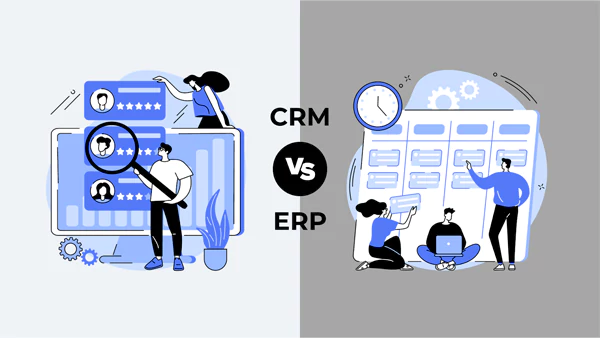
What is the difference between ERP and CRM? Both systems are powerful tools for businesses, but they are designed to help in different ways. Let’s take a glance at the key differences between CRM vs ERP:
| Aspect | ERP | CRM |
| Description | Software that helps manage overall business processes | Software that helps manage customer relationships |
| Main Use | Handles things like finances, HR, inventory, and supply chain | Focuses on sales, marketing, and customer service |
| System Type | Central hub for internal operations | Central tool to manage customer interactions |
| Who Uses It? | Teams like finance, operations, and HR | Sales, marketing, and customer support teams |
| Web-Based? | Yes | Yes |
| Main Focus | Improving efficiency and reducing internal costs | Building stronger customer connections |
| Supports | Back-office tasks like accounting and procurement | Front-office tasks like sales and marketing |
If we sum up in short, you can think of ERP and CRM systems as your business brain and customer expert, respectively.
Similarities Between ERP & CRM Systems
CRM and ERP might serve different main purposes, but they do have some common ground. Both help businesses organize their data, keep track of what’s happening, like customer interactions or sales, and generate useful insights through reports.
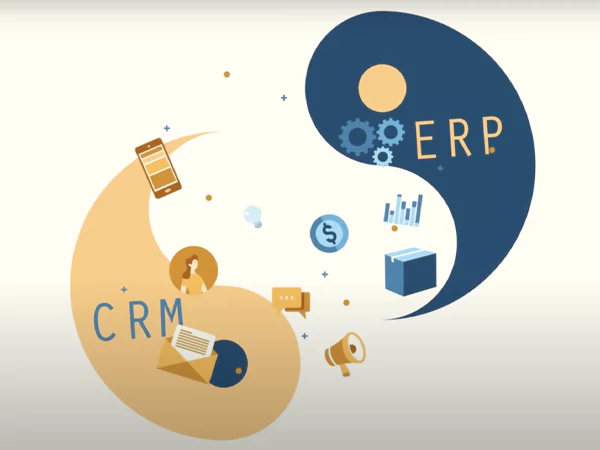
At their core, both software ERP and CRM are built around managing data. Whether it is details about customers, sales figures, or internal operations, they collect and store data that helps teams work smarter and make better decisions.
Together, they give a full picture of the customer journey. Another shared strength is the ERP and CRM integration. Both systems can connect with other software tools, allowing smoother workflows and less manual effort.
Knowing these similarities helps businesses decide what they need to save time and improve accuracy.
Benefits of Using CRM vs ERP
An ERP versus CRM guide cannot be complete without discussing their benefits. So, let’s explore some of the primary benefits of using software like CRM and ERP.
Advantages of Using ERP
- Streamlined Processes Across Departments
ERP brings together data from areas like finance, HR, supply chain, and more into one shared platform. This means that teams can work with the same, up-to-date information, which avoids confusion and helps in making faster and smarter decisions.
- Saves Time and Money
By automating routine tasks like data entry, ERP reduces manual work, cuts down errors, and speeds things up. Companies often save a lot on operating costs because they no longer need separate tools for each department. To give you some perspective, one business saved nearly $500,000 by switching to a cloud-based ERP.
- Better Decision-Making
With real-time reports and easy access to key data, managers don’t have to waste time digging through spreadsheets. The system puts all performance insights in one place, helping leaders act quickly and confidently.
- Boosts Productivity
It handles repetitive tasks like financial reporting, inventory tracking, or order updates without constant human involvement. It ensures material and customer orders are well-tracked, helping businesses run smoothly and deliver on time.
- Encourages Team Collaboration
Since all departments use the same system, teams like HR and finance can coordinate better. Everyone works with the same employee or project data, reducing miscommunication and delays.
- Improved Data Security
The software comes with role-based access, so only the right people can see sensitive data. This strengthens security, ensures compliance, and minimizes risks from internal errors or misuse.
Advantages of Using CRM
- Better Customer Experience
It helps businesses understand customer needs and preferences by storing detailed interaction histories. This makes it easier for teams to offer personalized and timely support that builds loyalty.
- Stronger Sales Performance
Sales teams get instant access to important customer information, helping them pitch better and close deals faster. It also supports smoother communication across departments, keeping everyone in the loop.
- Reduces Client Dependence on Individuals
If only one or two employees know a client well, losing them could harm that relationship. CRM prevents this by keeping all client history in one place so anyone can pick up where the last person left off.
- Smart Lead Generation
It can capture leads from your website, social media, or phone calls automatically. Once the lead is in the system, it can track their journey and help your team follow up effectively.
- Automates Key Tasks
CRM tools can send follow-up emails, assign tasks, generate quotes, and group customers based on behavior. This automation reduces mistakes, saves time, and helps you reach the right audience with personalized messages.
Now that you are aware of the benefits of using an ERP system vs a CRM system, let’s try to understand how to choose the right system for your business in the next section.
How to Choose the Right System for Your Business?
As businesses grow, managing everything with basic tools like spreadsheets or simple accounting software eventually becomes limiting. That’s when systems like ERP and CRM come in.
Choosing between ERP versus CRM depends on your business’s priorities.
- If your biggest challenge is keeping up with customer interactions and sales, a CRM should be your first step. It helps in tracking leads, following up on conversations, and improving services.
- If your business has complex operations, like inventory, accounting, or supply chain management, an ERP system is a better choice for you. It brings everything under one roof, from finance to logistics.
In reality, most growing companies will eventually need both systems. A CRM helps you build stronger customer relationships, while an ERP keeps your operations smooth and organized.
Here are a few more quick tips to choose the right system for your business:
- Small business with simple processes? – Start with a CRM.
- Mid to large business with more moving parts? – ERP might be necessary.
- In sales, marketing, or support? – CRM adds the most value.
- In manufacturing, distribution, or retail? – ERP is more useful.
- Want to grow faster and work smarter? – You will probably benefit from both.
Some modern tools also use AI to help automate tasks, predict trends, and improve service, all in one platform. If you are unsure, it’s worth talking to a software expert who can guide you based on your current setup and future goals.
Integration of ERP and CRM Systems
ERP and CRM integration means they can connect to each other and share data automatically. This integration helps businesses run more smoothly by giving everyone a complete and real-time view of customers, operations, and performance.
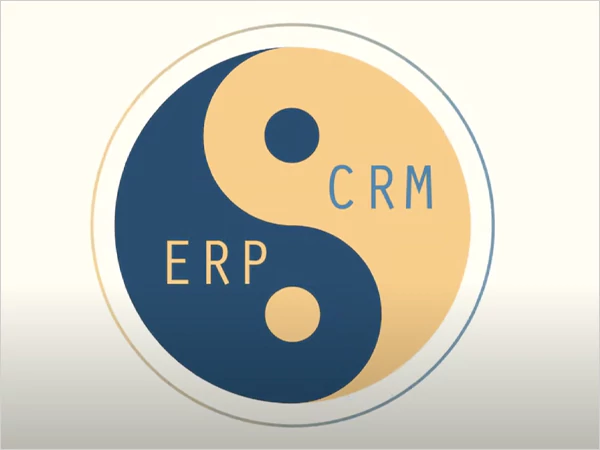
When both systems work together, you avoid duplicate data, improve efficiency, speed up approvals, and encourage better teamwork. For example, a sales representative can instantly check a customer’s payment history during a pitch.
The finance team will be able to calculate commissions without switching systems. Everything becomes faster, smarter, and more aligned. Think of CRM and ERP as a power couple, great on their own, but even better together.
While integration offers big benefits, it is not always simple. Data mismatches, mitigation risks, complex setup, and employee resistance are some of the most common challenges.
A successful integration takes planning, patience, and the right technical approach. When done right, it can transform how your business works.
Final Verdict: CRM or ERP?
So, this was all you needed to know in this ERP vs CRM guide. If your business is already using one system, adding another is a smart next step to strengthen overall business management.
A system that combines both CRM and ERP can offer multiple benefits. It is usually more cost-effective than buying separate tools. Plus, since everything runs on the same platform, your data stays up to date in real-time, with no delays or extra tools needed.
If you like this comprehensive guide, please share it with those who need to understand the topic better.
Frequently Asked Questions (FAQs)
Q: Can ERP and CRM work together?
Q: Is SAP a CRM or ERP system?
Ans: SAP offers both CRM and ERP systems. It offers various ERP tools for businesses of all sizes, which allow them to work effectively.
Q: Is Salesforce a CRM or an ERP?
Ans: Primarily, it is a leading CRM platform. However, it allows you to integrate it with an ERP system and also offers some ERP tools for specific needs.
Q: What are some examples of CRM?
Ans: Salesforce, HubSpot, Zoho CRM, Pipedrive, Freshsales, and Userpilot are some of the most popular examples of Customer Relationship Management tools.
Q: Is Microsoft Dynamics an ERP or CRM?
Ans: Microsoft Dynamics offers tools for managing customer relationships (CRM) and also for handling internal operations (ERP).
Q: What is the difference between an ERP and a CRM?
Ans: The main difference between CRM vs ERP is that CRM focuses on improving sales and customer service, and ERP handles the behind-the-scenes work to keep your business running smoothly.
Sources:

